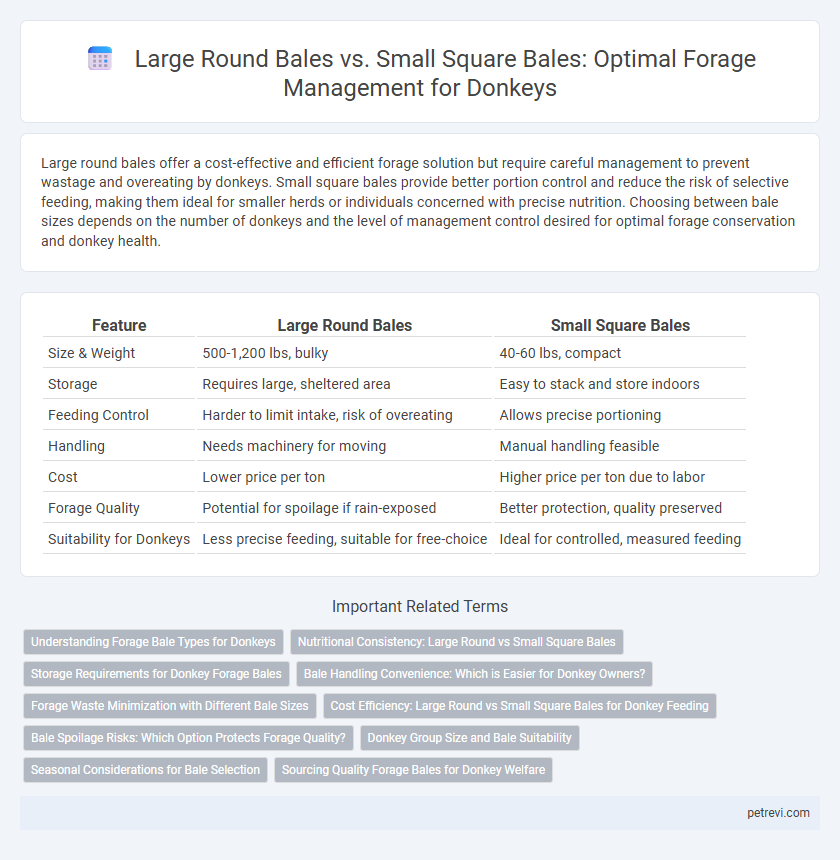Large round bales offer a cost-effective and efficient forage solution but require careful management to prevent wastage and overeating by donkeys. Small square bales provide better portion control and reduce the risk of selective feeding, making them ideal for smaller herds or individuals concerned with precise nutrition. Choosing between bale sizes depends on the number of donkeys and the level of management control desired for optimal forage conservation and donkey health.
Table of Comparison
| Feature | Large Round Bales | Small Square Bales |
|---|---|---|
| Size & Weight | 500-1,200 lbs, bulky | 40-60 lbs, compact |
| Storage | Requires large, sheltered area | Easy to stack and store indoors |
| Feeding Control | Harder to limit intake, risk of overeating | Allows precise portioning |
| Handling | Needs machinery for moving | Manual handling feasible |
| Cost | Lower price per ton | Higher price per ton due to labor |
| Forage Quality | Potential for spoilage if rain-exposed | Better protection, quality preserved |
| Suitability for Donkeys | Less precise feeding, suitable for free-choice | Ideal for controlled, measured feeding |
Understanding Forage Bale Types for Donkeys
Large round bales offer a cost-effective and time-efficient option for donkey forage management by providing ample feed with reduced handling time, while small square bales allow precise portion control and easier storage for individual donkeys. Understanding the nutritional requirements and feeding behaviors of donkeys is crucial to selecting the appropriate bale type, as large round bales can lead to wastage and overconsumption if not managed properly. Small square bales promote better diet monitoring and minimize forage spoilage, supporting optimal health and weight maintenance in donkeys.
Nutritional Consistency: Large Round vs Small Square Bales
Large round bales offer variable nutritional content due to uneven exposure to weather, potentially reducing forage quality for donkeys. Small square bales provide more uniform nutrient distribution, ensuring consistent intake of essential fibers and minerals critical for donkey health. Consistent forage quality from small square bales supports better digestion and overall wellbeing in donkey forage management.
Storage Requirements for Donkey Forage Bales
Large round bales require more substantial storage space with moisture control to prevent spoilage, making them less ideal for limited areas when managing donkey forage. Small square bales have compact dimensions, allowing easier stacking and better protection against environmental exposure in confined storage settings. Proper storage infrastructure is crucial to maintaining bale quality and nutritional value for donkey forage management.
Bale Handling Convenience: Which is Easier for Donkey Owners?
Small square bales offer greater ease for donkey owners in forage management due to their manageable size and lighter weight, allowing for simpler lifting and stacking. Large round bales can be cumbersome, requiring machinery for handling, which may not be accessible to all donkey owners. Efficient bale handling reduces physical strain and improves daily feeding routines, making small square bales a more convenient choice for most donkey care scenarios.
Forage Waste Minimization with Different Bale Sizes
Large round bales often result in higher forage waste for donkeys due to their bulk and reduced ease of handling, leading to trampling and soiling of feed. Small square bales offer improved forage waste minimization by providing manageable portions, reducing spoilage and allowing controlled feeding schedules. Efficient forage management with small square bales ensures optimal nutrition intake and cost-effectiveness in donkey care.
Cost Efficiency: Large Round vs Small Square Bales for Donkey Feeding
Large round bales offer superior cost efficiency for donkey feeding due to lower packaging and transportation expenses compared to small square bales. Although small square bales provide convenient portion control and reduced wastage, their higher labor requirements and increased handling costs often outweigh these benefits. Optimizing forage management for donkeys involves balancing bale size with storage capacity and feeding practices to maximize economic savings.
Bale Spoilage Risks: Which Option Protects Forage Quality?
Large round bales pose higher bale spoilage risks for donkey forage management due to their dense packing and limited airflow, which can promote mold growth and nutrient loss. Small square bales offer better protection of forage quality by allowing quicker drying and easier inspection, reducing moisture retention and spoilage. Prioritizing small square bales ensures fresher, more nutritious forage, supporting donkey health and reducing waste.
Donkey Group Size and Bale Suitability
Large round bales are generally more suitable for larger donkey groups due to their high volume and longer feeding duration, reducing labor and frequent bale replacement. Small square bales offer better portion control and are ideal for smaller groups or individual donkeys, minimizing waste and ensuring consistent intake. Choosing the appropriate bale size directly impacts forage management efficiency and donkey nutrition based on group size.
Seasonal Considerations for Bale Selection
Large round bales offer better moisture retention and are ideal for winter feeding when forage scarcity increases, ensuring donkeys have consistent access to high-quality hay. Small square bales provide ease of handling and storage, making them preferable during spring and summer when forage is abundant and frequent feeding is required. Seasonal variations in temperature and humidity directly influence bale selection, with round bales minimizing spoilage in wetter months and square bales supporting portion control during peak growth periods.
Sourcing Quality Forage Bales for Donkey Welfare
Large round bales can provide an economical and abundant forage source but may pose challenges in controlling portion size and preventing spoilage, potentially impacting donkey welfare. Small square bales offer precise rationing, easier handling, and reduced waste, ensuring consistent quality and better monitoring of intake for optimal health. Selecting high-quality forage bales free from mold, dust, and contaminants is crucial to maintaining digestive health and preventing respiratory issues in donkeys.
Large round bales vs Small square bales for Donkey Forage Management Infographic

 petrevi.com
petrevi.com